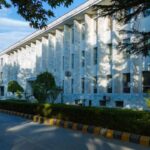The Ministry of Foreign Affairs (MoFA) claimed that the European Union has officially opened its embassy with a “permanent presence” in Kabul and has “practically commenced operations.”
Abdul Qahar Balkhi, the ministry spokesman, wrote on Twitter that the decision was made following a series of meetings and after an understanding was reached with EU representatives.
Balkhi added that apart from €220 million in humanitarian aid, the EU has announced €268 million in additional assistance and set aside a portion of this for teachers’ salaries.
The European Union also confirmed that it has re-established a “minimal presence” in Kabul.
“The EU has started to re-establish a minimal presence of international EU Delegation staff to facilitate the delivery of humanitarian aid and monitor the humanitarian situation,” the European Commission foreign affairs spokesman Peter Stano said as quoted by Reuters.
“Our minimal presence in Kabul must not in any way be seen as recognition. This has also been clearly communicated to the de facto authorities,” he added.
Political analysts believe the European Union is concerned over the situation in Afghanistan.
“The European Union has massively invested in the past 20 years, and therefore, it doesn’t want to be distant from the issues related to Afghanistan,” said Javid Sandel, a political analyst.
“It is a window for release of the Afghan assets. The (resumption of EU mission) is a good move,” said Aziz Maarij, a former diplomat.
“The engagement of the EU with the Taliban doesn’t reflect representing all European countries in diplomatic ways. All European countries have their own embassies in Kabul such as the Netherlands, France and others,” said Shukria Barakzai, former Afghan ambassador to Norway.
This comes as the European Union announced earlier this week that it has launched multiple projects in Afghanistan, amid the dire economic situation in the country, to prevent a further deterioration of the situation and also to help the Afghan people cope with current problems.
The EU has said that the funds are set to support projects for education, health, and the livelihoods of Afghan people.











